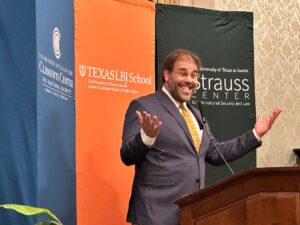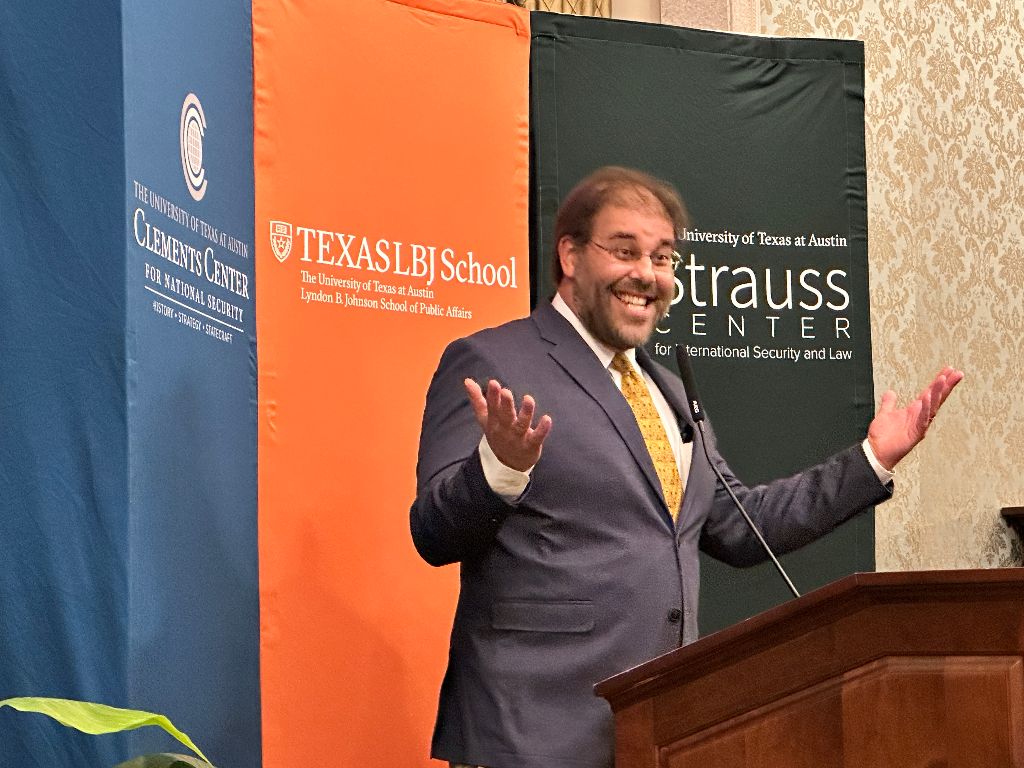“Democracy was our civil religion. The last 6 or 7 years have shaken me because I’ve seen changes in our institutions, threats to our institutions and undermining of our institutions that I’d never thought I’d see.”
Dr. Jeremi Suri was speaking for millions of American citizens, and many more millions around the world, when he uttered these sentiments at the University of Texas a few days ago. Suri holds the Mack Brown Distinguished Chair for Leadership in Global Affairs at the University of Texas, where he is a professor of history.
The occasion was the launch of his book Civil War by Other Means, which details the resistance movement against the vision of America fought for by Lincoln and the Union troops. His insightful book covers the period between two presidential assassinations: Lincoln in 1865 and Garfield in 1881.
“Most of my other books focused on American policy-making. I believe diplomatic and political history is the best insight for understanding our world today. My scholarship presumed there were certain bedrock parts of our democracy that weren’t going to change, including peaceful transitions of power.” Suri highlighted the ouster of Senate leader Trent Lott in 2002 (Lott called for the preservation of racial segregation). Suri said that Lott’s resignation was not political correctness, but rather that “there were lines that you don’t cross regardless of your politics. But what he said then, compared to what we hear today, was pretty minor.”
To put in historical perspective the vileness we see embraced today by the party Lincoln founded, Suri has done a deep dive into what he characterized as “a number of cancers that developed in our institutions” during the Civil War, which he called the “Second American Revolution.” Extending the medical analogy, he said “the tumors from these cancers had been lodged in these institutions for a long time, allowing the body to still go on in a healthy way.” But at times, because of environmental conditions and bad behaviour, “those tumors can metastasize and debilitate the body. And that’s where we are today. My book is an effort to understand those pathologies that go back to this Second American Revolution.”
Suri stated in his talk at UT that “one of the most important moments in my book is at Appomatox,” and while his argument is sound, the Index to his book is not, as Appomatox is not to be found. Nonetheless, the surrender of General Robert E. Lee to General Ulysses S. Grant, at that location, “is the heroic part of the story,” and the one everyone learns in school. The aftermath of that surrender is what really needs to be taught; as Suri warns, “teaching feel-good history is negligent parenting.”
“Grant reveals in his memoirs, written at the end of his life, what he said to Lee at the meeting. ‘I asked General Lee to help me reconcile the two parts of our country. And General Lee said to me that the South is a very big country and you might have to march over it three or four times before this war is really done.’” In the event, Lee never renounced the cause of the Confederacy, nor did he renounce those who continued to defend the cause. “Lee was not part of the solution, he was part of the problem.”
Suri highlights an obscure but shocking episode in the life of our city in 1865. More than 50,000 Confederate soldiers did not surrender, but actually marched through Austin on their way to Mexico, under the command of General Joseph Shelby. In his book, Suri writes that in Austin “Shelby’s troops helped to protect that state treasury and other assets. Governor Pendleton Murrah hailed them as protectors, and he then joined the exiles.” Shelby and his men joined a foreign military, the army of Emperor Maximilian. Shelby’s goal was a startling one, as Suri writes in his book: “to rebuild the Confederacy in Mexico and bring it back to the American South.”
After the defeat of the Mexican Emperor, they returned to the United States where they actively worked to promote white supremacy, made easy for them when President Andrew Johnson pardoned all those traitors in 1868. Suri told the audience that from 1880 to 1944, it was illegal for a non-white to vote in a primary election in Texas. Thus, by the 1870s and 80s, “you have the very people who lost the war – without recanting why they fought – now running key institutions of democratic accountability within the United States.” Shelby, for example, was appointed by President Cleveland as U.S. marshal for western Missouri and Kansas City!
“This is obviously relevant to where we are today. Organised violence and bullying became the lingua franca of politics in much of our country. After the Civil War it’s not only that people go home with their weapons, it’s that local organization of violence becomes standardized in a way it was not before the Civil War.” The rise of such paramilitary violence is exactly what is feared now in 2022. Suri’s book is replete with horrors that have been conveniently forgotten, such as the Memphis Massacre of 1866, when a white mob killed 46 African American residents. But white men were not immune either. In 1870 in North Carolina, state senator John Stephens was murdered by the KKK for supporting African American suffrage. Quite frankly, the details of sexual atrocities by the KKK (against both white and black people) detailed in the book are so evil I can’t even put it in this article.
Declaring that “there is no leader for all seasons,” Suri opined about a way forward for our own times. “What we see in this period is how our system might actually be built to choose the wrong leaders. Time and again after the Civil War until the early 20th century most people can’t even name the presidents. We have the closest elections in our history, highest turnout among eligible voters (85% in the 1890s) and we get singularly inappropriate people in the office of the presidency. Andrew Johnson actually showed up drunk to his inauguration.”
His predecessor, Lincoln, “defined democracy better than anyone can: of the people, by the people and for the people. But after the Civil War, because of the transformation of slavery and the American population, our society became counter-majoritarian which violates that very principle.”
“It’s not that our democracy can’t choose qualified people, it’s that the procedures have evolved to a point in which they don’t help us select the best leaders. There are some things we can change which would make a huge difference. We can change the way we hold primaries! What happens in primaries is that the most extreme members of the party come out and they have disproportionate influence over who gets chosen.” Speaking of the situation here, where Ted Cruz is the junior senator from Texas, Suri said “if we did not have a primary system that was biased to the extremes we would probably still have a Republican but a different junior senator from Texas.” Rank-order voting in primaries would save us from such a fate.
Suri’s book is rich with detail, delivered in fine prose that moves the story along. While written by an academic, it is not burdened with the usual academic style that appeals only to professional scholars such as myself. This is an essential book for anyone interested in American history, and I would urge that it become mandatory reading for American history classes at the high school and college level.
Civil War by Other Means: America’s Long & Unfinished Fight for Democracy is published by Public Affairs. It lists for $30.
Photo by C. Cunningham; the talk was hosted by the LBJ School of Public Affairs, The Strauss Center for International Security and Law; and The Clements Center for National Security.

